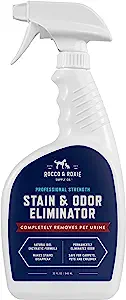Our goal is to share information and products that are truly helpful to renters.
If you click on a link or buy a product from one of the partners on our site, we get paid a little bit for making the introduction. This means we might feature certain partners sooner, more frequently, or more prominently in our articles, but we’ll always make sure you have a good set of options. This is how we are able to provide you with the content and features for free. Our partners cannot pay us to guarantee favorable reviews of their products or services — and our opinions and advice are our own based on research and input from renters like you. Here is a list of our partners.
5 ways to get rid of cat pee smell in your apartment
Plus, why your cat is peeing outside the box and how to fix it.
Cats are wonderful companions, but when they have accidents or don’t use the litter box, it’s easy to get frustrated. Cat pee has a strong scent and it can quickly become an issue if you live in an apartment. If you are a renter, you may be wondering if your security deposit is in jeopardy because of it.
Relax, cat lovers. Your cat peeing outside of the litter box doesn’t have to cost you your rental deposit or make your apartment smell like a giant litter box. In most cases, with good detective work and cleaning you can get rid of the cat pee, save your carpet, and get your full apartment deposit back.
Five ways to get rid of cat pee and odor in your apartment
While cleaning urine from tile or linoleum may be simple. You may need to use more advanced methods for cleaning urine from fabric, carpet, or mattresses.
1. Enzyme cleaners to remove cat pee
Enzyme cleaners break down biological matter like urine, feces, and vomit.
They are excellent for cleaning pet stains because the enzymes break up the “deposit” and neutralize it.
Not all products work with all pet pee problems. You may need to try a couple of different cleaners to find the one that works on your cat’s unique urine smell.
The enzyme cleaners that vets recommend, and cat owners swear by, are Jackson Galaxy’s Stain And Odor Remover, Nature’s Miracle Urine Destroyer, and Rocco & Roxie Odor Eliminator.
2. Water and vinegar solution to eliminate cat pee
Another option you can try is a homemade cleaner made from white vinegar and water.
Add one cup of white vinegar to three cups of hot water.
Pour enough of the solution on the stain to saturate it. Let it sit for a few minutes, then blot up the moisture and let the carpet dry. Repeat if necessary.
3. Baking soda to help remove urine odor
If the vinegar and water mixture got rid of the stain, but you can still smell urine, mix up another batch of the vinegar and water cleaner but add two tablespoons of baking soda to the mixture.
Let the mixture sit on the stain for up to 30 minutes to get rid of the odor. After 30 minutes, pat your carpet dry.
4. Peroxide and dish detergent
You can also try this DIY version of cleaner to get rid of cat urine odor.
To create the cleaning solution, mix two tablespoons of hydrogen peroxide and a drop of dishwashing soap.
Pour it on the carpet and use a scrub brush to work it gently into the carpet fiber.
Let it sit, and then blot the carpet with paper towels or a rag. Let it dry, and (hopefully) the smell should be gone.
5. Carpet steam cleaner for tough cat pee problems
If you can’t get the stain to come out or still smell cat pee, you might need to bring out the heavy equipment – a steam cleaner.
You can rent or borrow one if necessary. Use hot water and a cleaning solution designed to get rid of pet stains.
In most cases, this will clean your carpets of pet smells. If not, call a professional carpet cleaner and schedule their services.
Why your cat is not using the litter box to pee
If your cat is usually good about using the box but they suddenly stop using it, chances are, that your cat is not just being a jerk.
Cats often try to communicate that they don’t feel well by changing their litter box habits.
- The first thing you should do if your cat starts peeing outside the box or on your clothes, mattress, or on the carpet is to take your cat to the vet. A full vet exam and a urinalysis can help your vet determine if your cat is sick.
- Cats get urinary tract infections (UTI) easily. Stress, changes in the environment, food changes, or a medical issue can cause UTIs in cats. If your cat has a UTI, antibiotics from the vet will clear it up in a week or so.
- Once you have ruled out a medical issue, it’s time to look at behavioral issues. Your cat may be stressed out. Have you had a lot of visitors or guests at your apartment? Did you just move or are you getting ready to move? Maybe you recently got a new dog or cat? Any of these things may cause stress and peeing in inappropriate places. Talk to your vet for help or advise on how to make your cat feel safe and secure.
Cats are extremely sensitive to their environments and routine.
Changes to the environment or the routine can make a cat stressed causing them to misuse the litter box. If you’ve recently added (or taken away) a human or pet to the household those life changes can cause your cat to act out.
Spaying or neutering may prevent cat pee outside of the litter box
If your cat has not been spayed or neutered, that could be causing them to pee outside the litter box. A female cat will often “mark” territory by peeing on the floor, the walls, and even on furniture or clothing, hoping to attract a male cat.
Unneutered male cats will often pee on the walls or spray urine in corners, near the litter box, or by the windows or doors, trying to “mark” their territory and attract females. Getting your cat spayed or neutered can fix these problems quickly.
Most apartments require that cats be vaccinated and “fixed” or “altered.” Check your lease to see if your cat is required to be altered and if so, get your cat fixed right away.
If you have multiple cats, and they are all fixed and healthy, they may be having issues with each other. In this case, try using multiple litter boxes and be sure to keep them clean.
How to stop your cat from peeing outside the litter box
Unfortunately, you can’t fix your cat’s behavioral issues with an antibiotic the way you can with a UTI. But there are products you can try to get your cat to stop urinating inappropriate places.
1. Pheromones
Pheromone products are often recommended for anxious cats. You can get pheromones in a spray or a handy plug-in diffuser.
Pheromone products mimic the pheromones that a mother cat emits and makes cats feel safe and secure in their environment.
Feliway is a vet recommended pheromone product.
2. Urinary Supplements
If your cat tends to pee outside of the litter box because it has urinary tract sensitivity or other medical issues giving an over-the-counter cranberry supplement like Uromaxx daily helps keep your cat’s urinary tract healthy so they will use the litter box regularly.
3. Medication
If your cat is peeing outside of the litter box because of stress or anxiety and over-the-counter products aren’t working you can ask your vet if anti-anxiety medication might help.
Small doses of anti-anxiety medication can help cats who can’t get over their anxiety or fear using over-the-counter products.
Finding the source of the cat pee odor in the apartment
If you have hard floors in your apartment, it’s pretty easy to see where your cat has urinated. To clean up fresh urine stains, mop up the liquid with a paper towel or a rag, and then apply an enzyme cleaner to the stain right away.
Follow the directions on the bottle to eliminate the smell before it sets.
Sometimes finding cat urine can be difficult.
The only surefire way to find a urine stain on a carpet is to use a blacklight. Biological material, like urine, glows under blacklight. Blacklight flashlights are inexpensive and they’re something that every pet owner should have.
Wait until the room is dark and then go over the entire room with the blacklight.
Talking to your landlord about pet odor and cat pee stains
Your landlord may also use a black-light to survey your apartment after you move. They may do this even if there is no odor in the apartment.
If you’ve done your best to get the cat pee odor out of an apartment, but you are worried about getting your security deposit back, then talk with your landlord honestly about the situation.
You are much better off trying to address the problem instead of hiding it. And honestly, it’s better for the next renter who will be moving in after you.
A few tips that help to show good faith if you think you are at risk,
- Get your carpet professionally cleaned and deodorized.
- Explain that your cat had a medical or behavioral issue and soiled the rug. Tell your landlord the steps you took to mitigate the damage.
- If you are paying pet rent and paid a pet deposit, remind your landlord that you have already paid to cover damages caused by your pet.
- Ask your landlord what else you can do to ensure that you can get your deposit back.
Some landlords will give you the security deposit back but keep the pet deposit, which is fair.
Others may give you the deposits back because you made a reasonable effort to fix the damage.
In almost all cases, if you make a good faith effort to fix the problem, the landlord will give you at least some of your deposit back.
Join the Roost Community
Roost connects you to expert advice, handy planning tools, and tailored recommendations to help make renting simple and rewarding.
Your renters rights, in your state.
Explore what you need to know.
- Alabama Renters Rights
- Alaska Renters Rights
- Arizona Renters Rights
- Arkansas Renters Rights
- California Renters Rights
- Colorado Renters Rights
- Connecticut Renters Rights
- Delaware Renters Rights
- Florida Renters Rights
- Georgia Renters Rights
- Hawaii Renters Rights
- Idaho Renters Rights
- Illinois Renters Rights
- Indiana Renters Rights
- Iowa Renters Rights
- Kansas Renters Rights
- Kentucky Renters Rights
- Louisiana Renters Rights
- Maine Renters Rights
- Maryland Renters Rights
- Massachusetts Renters Rights
- Michigan Renters Rights
- Minnesota Renters Rights
- Mississippi Renters Rights
- Missouri Renters Rights
- Montana Renters Rights
- Nebraska Renters Rights
- Nevada Renters Rights
- New Hampshire Renters Rights
- New Jersey Renters Rights
- New Mexico Renters Rights
- New York Renters Rights
- North Carolina Renters Rights
- North Dakota Renters Rights
- Ohio Renters Rights
- Oklahoma Renters Rights
- Oregon Renters Rights
- Pennsylvania Renters Rights
- Rhode Island Renters Rights
- South Carolina Renters Rights
- South Dakota Renters Rights
- Tennessee Renters Rights
- Texas Renters Rights
- Utah Renters Rights
- Vermont Renters Rights
- Virginia Renters Rights
- Washington Renters Rights
- West Virginia Renters Rights
- Wisconsin Renters Rights
- Wyoming Renters Rights
- Washington, D.C. Renters Rights


